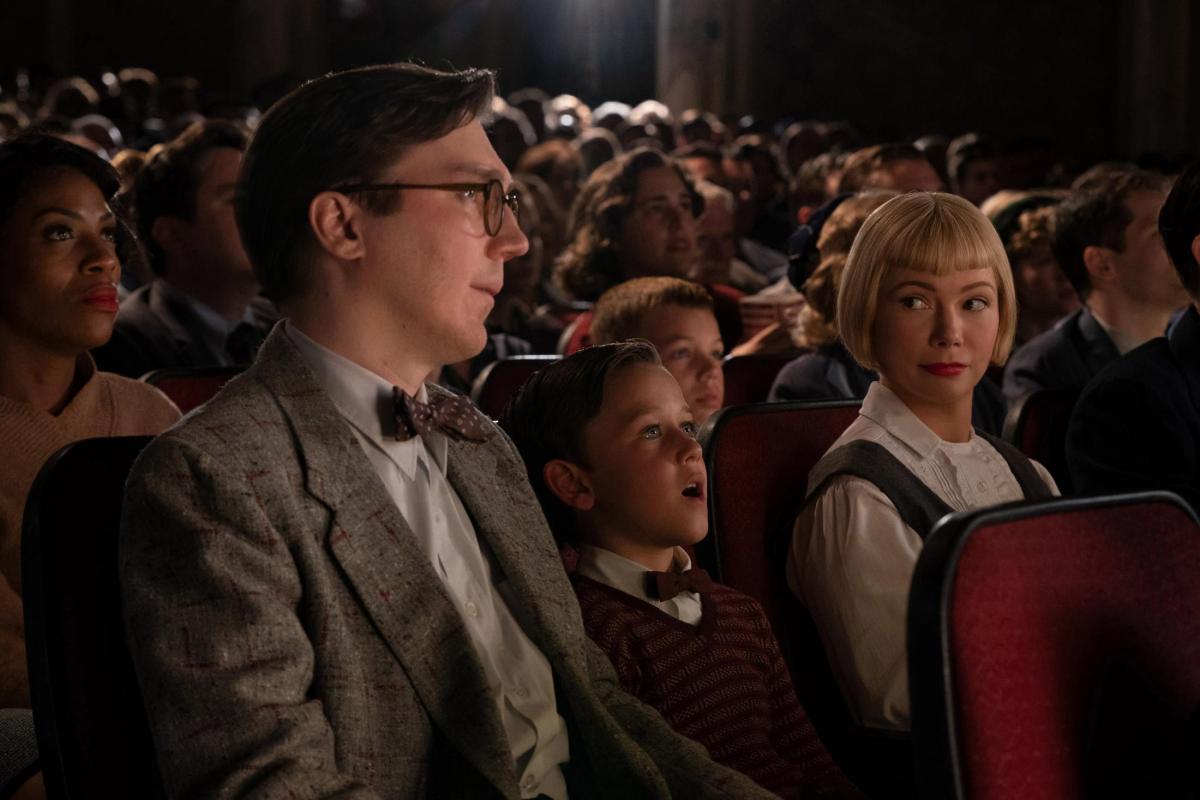
Steven Spielberg, the master entertainer of American cinema, can literally make any kind of film he wants: rousing adventures, timeless fairy tales, gripping war films, and even, as we saw with West Side Story, show-stopping musicals. But he has never made a film this intimate. The Fabelmans is a largely autobiographical story of his coming of age—as a filmmaker and a man. But it’s also a story of mid-century American Jewish childhood, in ways both universal and achingly specific.
Sammy Fabelman (played by Mateo Zoryon Francis-Deford as a child) has grown up in New Jersey with his engineer dad, Burt (Paul Dano), his dreamy, artsy mom, Mitzi (Michelle Williams), and his two sisters (a third will come soon).
The film’s opening scene sets up the dynamics of Sammy’s childhood expertly. He is in line with his parents to see his first-ever movie: Cecil B. DeMille’s The Greatest Show on Earth. Dad is holding court about the technical aspects of creating motion pictures. Mom sighs, closes her eyes, and says, “Movies are dreams you never forget.”
Indeed, young Sammy is transfixed by the film—and terrified by its famous train crash. With the new model train set his father has purchased him, he tries to recreate the crash—and he films it. His mother intuitively understands that this is his way of conquering his fear.
Sammy is a perfect combination of his parents. Like his mother, he is sensitive and loves art. But he has the technical mind of his father, allowing him to frame shots and, as he moves into his teenage years, fake gun shots and explosions.
His parents’ marriage is central to the film. As true of so many women of her generation, Mitzi gave up a promising career (in her case, as a pianist) to start her family. She’s restless, dissatisfied—and prone to dark moods that can overtake her. Burt is as decent, solid, and dependable as a 1950s dad from a sitcom. But he often doesn’t know what to do with his temperamental wife. He’ll never fully understand her.
A fixture in the family is the kind and jokey “Uncle Benny” (Seth Rogen), who is supposedly Burt’s best friend but seems to have a special connection with Mitzi. He stares at her with suspicious adoration. There are also, of course, bubbes and aunts and uncles, who come for dinner and complain about Mitzi’s use of paper plates and plastic utensils on a disposable tablecloth (she hates doing dishes and cleans the post-meal debris in one dramatic swoop).
Eventually, Burt gets a job for GE and moves the family to Phoenix. Now Sammy is a teenager, played by Gabriel Labelle (how they managed to find a young man who looks like a young Spielberg and is also a brilliant actor is a miracle of casting). He finds friends and uses them as actors and crew in his movies—which have names like Gunsmog and Escape to Nowhere. He begins to see the power his moving images have—the way he can rouse an audience to laugh, to scream, to cheer. His mother encourages his filmmaking; his father waits for him to snap out of it.
But film can also be a truthteller—as becomes evident when the family takes a camping trip, Uncle Benny in tow. Sammy’s camera reveals things that he was not able to see in person.
It’s when Burt gets a job with IBM and takes the family to Northern California—this time without Uncle Benny tagging along—that things begin to unravel. At school, Sammy is taunted by antisemitic boys. He is also courted by a girl who somehow conflates religious zealotry with sexual fervor—she wants to make out with Sammy and convert him to Jesus. Mitzi becomes more unsettled; she buys a monkey to entertain herself—which even she acknowledges is a little nutty. As Mitzi, Williams remains that rare actress who can evoke instant empathy with the smallest of gestures. She will break your heart.
The Fabelmans is a film about a young man learning the power of image-making. We see the results of that power in this film. It’s not without flaws. An extended cameo by Judd Hirsch as an uncle in show biz (complete with a thick Yiddishe accent) feels heavy-handed and gimmicky. A scene where one of Sammy’s antisemitic tormenters has a revelation about films’ ability to build and sustain myths has a ring of “state your thesis!” But these are minor concerns. The Fabelmans is beautiful, involving, often spellbinding. Spielberg has now demonstrated that he can look inward, as well as outward, and still command every frame.
